Talks on ‘Uttarkand – Shri Ramcharitmanas – Victory of Goodness” – November 2018
Talks on “Uttarkand from Shri Ramcharitmanas – Victory of Goodness” – by Swami Abhedananda
(Gyan Yagna conducted from 1st November till 4th November, 2018)
Key Points from the Discourses
Day 1
Sharing below some snippets from the Monthly Gyan yagna that commenced at Chinmaya Ashram Queensbrugh on the topic ‘Victory of Goodness’. During these discourses, Swami Abhedanandaji is elaborating upon the beautiful portion of Bhagavan Ram returning to Ayodhya, taken from Uttarkand of Tulsi Ramayan. Here are few of the memorable takeaways from first day’s satsang:
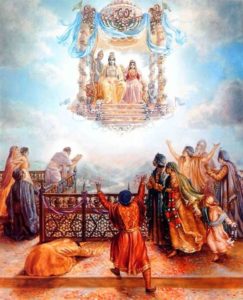 Outer & Inner Festival
Outer & Inner Festival
There can be two types of festivals – one is the outer festival that comes and goes, and other is the inner festival that comes but does not go. The outer Diwali comes on a particular day and goes away, but if the same Diwali comes inside our hearts, it won’t pass, it will last forever. A person should be such, that festival becomes the nature of his mind so that wherever he goes, it’s festive around him; he is like a lamp by himself.
Who is victorious in your life?
- The word ‘Ayodhya’ means – where Yudhha (war/fight) is not present. In our life, there is a yuddha everywhere (house, office etc.) because something is constantly disturbing us and our identity, our likes, our dislikes are continuously challenged. We are not at peace because we are unable to do what we want to do, and instead forced to do what we don’t want to do. We don’t live in Ayodhya; we live in a place where there is a constant fight.
- When Bhagavan Ram was leaving Ayodhya, nobody was chanting ‘Siyavar Ramchandra ki Jai’ (May Bhagavan Ram be victorious). Because that day it was not the victory of Ramji, it was the victory of Kaikeyi and Manthara. They had accomplished, what they had conspired for. That day was not the victory of Dashrathji or Bharatji or Lakshmanji either.
- There are a lot of emotions in us – anger, ego, jealousy, hatred, but there is also faith in Ishwar & Guru, devotion, dispassion etc.; the point is, who is victorious among these in our heart? They all whisper something at times but which particular emotion becomes loud… that we have to analyze.
- We have ten sense organs and then we have our mind, memories and experiences. There is one inner boss, the head, which employs all these instruments and decides what they should be used for. Our tongue can be used for chanting Lord’s name and His glories, but the same tongue can also be used for accusing and abusing. Our eyes can see the beautiful Lord, but the same eyes can see flighty things too. Our feet can do the Kailash parikrama, but the same feet can take us to a bar too. It all depends on who is the head, the controller?
- These instruments are innocent, they should not be blamed, it is us who decide whose ‘Jai’ (victory) should prevail in our lives. We should not allow our anger, frustration, ego, selfish desires etc. to be victorious. Our lifestyle and daily schedule should be such that even if these negativities are present in the mind, we don’t let them speak and overpower us.
- In Ravan’s life, all these negative emotions were victorious, and therefore, even after having intelligent advisers around him (like Vibhishan, Mandodari) he never listened to them. Similarly we too have knowledge of Ramayan and Gita, but when anger, ego or lust rises, they silence our knowledge. The beauty in life is to prioritize wisely so that our knowledge is victorious at all times.
Let us celebrate – The Inner Diwali
Diwali is always celebrated after Dussehra. The word ‘Dussehra’ means – defeat of the ten headed Ravan. While Ravan was defeated conceptually on the very first day, the physical fight had continued. On the last day when Bhagavan Ram returned victorious to Ayodhya, everybody celebrated and there was Pattabhishek (coronation ceremony) when Ramji was installed as the Lord, the King of Ayodhya.
- You cannot truly have Diwali unless you have Dussehra – meaning without killing the delusion (Ravan) you cannot celebrate the victory of goodness (Lord Ram). The outside Diwali may come and go but the inner Diwali will not come due to the darkness inside. You will not be in Ayodhya but rather be in Lanka where resides Ravan (delusion), Kumbhkaran (ego) and Meghanath (selfish desires).
- Delusion is the source of all our problems. Seeing something as ‘I’ or somebody as ‘mine’ and seeing joy in the outer world – this is delusion.
- Meghanath (desire) was the most difficult to defeat because he could change forms. On the battlefield, he would suddenly disappear but then again come back and pour rains from the sky and and lit fire on the ground, leaving no place for the monkeys to go. This depicts that – Kaam (desire) creates Raag (attachment) and Dwesh (aversion).
- Everybody is troubled because of attachment and aversions. To have inner Diwali we have to kill the all three – delusion, ego and desire. Only after killing them we can go to Ayodhya and say ‘Ramchandraji ki Jai’.
- We should take a sankalp that inside us Bhagavan Ram should always be victorious and that is the real Diwali. When Lord is victorious then alone bhakti (devotion) and dispassion will be victorious in our lives.
Lord’s touch – the beauty of grace
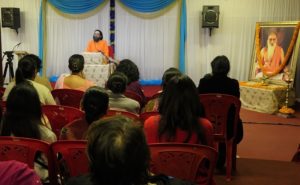 In Ramcharitmanas, before starting any Kand, Tulsidasji does Mangalacharan. Mangalacharan is done because when we perform actions, the fruits of our actions are not in our hands, we don’t know if we will be successful or not.
In Ramcharitmanas, before starting any Kand, Tulsidasji does Mangalacharan. Mangalacharan is done because when we perform actions, the fruits of our actions are not in our hands, we don’t know if we will be successful or not.
- Mangalacharan is our prayer to the Lord so that He can do something to make our actions wonderful and our work is completed beautifully. Everything can be a marvelous success only if the Lord touches it. He can also spoil the show very easily. What is in our hands? The more we realize this truth that there is somebody else who is the ruler, the more we become softened and surrendered.
- There comes a story of a pregnant deer who was chased by a lion on one side and was being hunted by a hunter on the other. This helpless deer was miraculously protected by the Lord. When the hunter shot his arrow, there was a sudden lightening and heavy rains, the arrow struck the lion instead of the deer and the heavy rains forced the hunter to retreat. Thus, the deer was saved and could deliver her fawn.
- There are so many unknown factors around us and therefore we must chant the Mangalacharan, so that the grace of the Lord is present in every good work undertaken by us.
- Many a times we experience that we start some work but it fails and with one small thing everything goes haywire. Therefore, it is important to do the aaradhana of the Lord before undertaking any task. If the Lord is not pleased we will certainly have a lot of obstacles in our endeavours.
Becoming small in front of the Higher
- Tulsidasji, in the Magalacharan, offers namskaar to Bhagavan Ram. Namskaar means, ‘You win I will lose; I am very small, You are very big.’ Those who become small i.e. who carry the notion that their desire has no value, they only become big. Those who try to become big, are pulled down by situations.
- If we insist on doing things our way, we tend to lose our position. Only way to get your position is to leave your position. We generally don’t like the people who tend to act big in front of us. Such a person is not loved. Our attention and care go to that person who tends to be small and humble. This is the power with which devotees win.
Day 2
On the second day of the yagna, Swami Abhedanandaji beautifully described the episode of Hanumanji giving the most awaited news of Lord Ram’s return to Shri Bharatji. We bring to you some nuggets from Swamiji’s discourse.
Beautiful facets of Shri Bharatji’s character
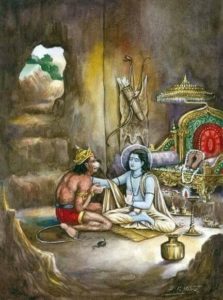 To bring Bhagavan Shri Ram to Ayodhya, there is one key person who was greatly responsible and that was Shri Bharatji. While living in forest, Bhagavan Ram had started loving the forest life but Bharatji’s thirst was so much for Him that He had to turn His feet towards Ayodhya.
To bring Bhagavan Shri Ram to Ayodhya, there is one key person who was greatly responsible and that was Shri Bharatji. While living in forest, Bhagavan Ram had started loving the forest life but Bharatji’s thirst was so much for Him that He had to turn His feet towards Ayodhya.
Shri Bharatji’s character has numerous beautiful facets such as:
- Deenta: Bharatji had extreme deenta (feeling of smallness)
- Deenta is opposite of ahamkara (ego), and it means to have the bhaav that ‘I am very small and I am very bad in front of the Lord.’ The sign of ego is – ‘I am better, I am right, I should win’.
- Bharatji was so full of deen bhaav that when he was offered the kingdom of Ayodhya, he said, ‘The moment I will become the king, this earth will sink because I have a lot of sin.’
- Thirst for Bhagavan Ram: We all have some thirst, but Bharatji’s thirst for Bhagavan Ram was tremendous.
- During the whole period of Ramji’s exile, Bharatji stayed in Nandi Gaon, a small village near Ayodhya. He used to sleep in a ditch and every night asked Shatrughnaji only one question– ‘How many more days are there for Ram bhaiya’s vanvaas to be completed?’ Because of deep remembrance for Bhagavan Ram, Bharatji used to remain awake all night.
- Love is not possible unless you go through pain for your beloved. Every morning Bharatji used to do Paduka puja of Bhagavan Ram’s padukas and talk to them. Saints say that Bharatji had so much bhaav that the padukas also used to reply back.
- He used to do all the administrative work of the kingdom, talk to the people, think about everyone’s requirements; he was never negligent of his master’s duty. His idea was to offer an even better Ayodhya to his brother Ram when He returns.
- When Bharatji was told by Vashishthaji that he can become the king for time being and when Ramji comes back, he can return the kingdom, Bharatji refused as he believed – Naivedya is first offered to God and then taken as Prasad, but him ruling would be like eating the naivedya first and then offering.
- If Bharatji had become the king and Ramji would have known that Bharatji was happy and everything was going on well, then Ramji would not have come back to Ayodhya.
- Sacrifice: Bharatji was not told by anybody to go and live in Nandi gaon; he himself sacrificed all the comforts of the kingdom. You may do some sacrifice because you are asked, but you are known by that sacrifice which you do unasked.
Longing for Bhagavan Ram’s Return
- On the last day, Bharatji was very anxious; he kept pacing up and down. There was a lot of happiness but there was also little sadness thinking – ‘What if bhaiya Ram doesn’t come?’ He said to Shatrughnaji, “Why my brother Ram hasn’t come yet? I think, seeing my crookedness, he is not coming.” Ras (bhaav) comes in love when you think you are wrong and small.
- Then Bharatji smiled and said, “Lakshman is so fortunate to have gone with my brother Ram. He loves Ram bhaiya so much. At least someone like Lakshman is there to give Him lot of joy. It’s not important that I should be there.” Bharatji’s thoughts were so pure that he was not competing or comparing himself with Lakshmanji, he was simply rejoicing Lakshmanji’s love for Bhagavan. World demands total subjugation of our ego.
- It is written in Ramayan that Bhagavan Ram used to get deeply touched seeing Bharatji’s state during those 14 years, and He also used to get up in the night and take his mala and do jap of Bharatji. Such was the glory of Shri Bharatji’s thirst and love for Bhagavan!
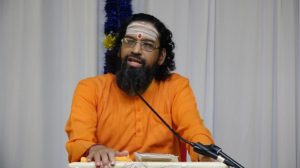 Divine moment – the meeting of two great saints
Divine moment – the meeting of two great saints
- When Bhagavan Ram was on Pushpak viman returning to Ayodhya, He asked Hanumanji to give the news of His return to Bharatji. Hanumanji came in the form of Brahmin. He was like a boat that helped Bharatji cross the ocean of virah (sorrow) caused by being away from Ramji.
- When Hanumanji saw Bharatji’s virah for Bhagwan Ram, he could not control himself and tears flooded his eyes. He was overwhelmed seeing Bharatji’s love for Bhagavan Ram and saw his ideal in him. It was the divine meeting of two great saints.
- Hanumanji spoke with sweet nectar like voice – ‘The one who you long for, the one who you think of day and night, the one whose name you utter day and night, that Bhagavan Ram, that giver of joy, that Lord is coming. He has conquered Ravan and He is coming along with mother Sita and Lakshmanji’.
- Bharatji opened his eyes, but his vision was blurred because of the tears. He wiped his tears; it was as if a thirsty person got water for the first time after fourteen years. Bharatji told Hanumanji, that seeing him, it felt like Bhagavan Ram Himself has come. He enquired who Hanumanji was and how he knew so much about Ramji.
- Hanumanji took his original form and introduced himself saying that he is just a simple monkey and a servant of Bhagavan Ram. When two humble people meet, there is a lot of joy. Bharatji got up and they embraced each other.
The joy of Bhagavan’s return
- With a lot of eagerness and love, Bharatji started asking Hanumanji, questions regarding Ramji’s well-being. Again and again he asked, to ascertain that Bhagavan Ram is happy. Love is the biggest power on earth. All our actions are driven by love. You can’t be in any place for a long time, if there is no love there.
- Bharatji is extremely emotional but at the same time highly intellectual. After receiving the news from Hanumanji, Bharatji was not carried away by his joy and forgot about others. He knew the whole Ayodhya was waiting for this news.
- Bharatji first gave the news to his Guru Vashishthaji, who had been the protector of Ayodhya for the last fourteen years. This was the vivek of Bharatji. The second to receive the news was mother Kausalya, as the one who is longing deserves to get the news first. The news of Ramji returning then spread like a wildfire across Ayodhya!
- When Hanumanji returned to Bhagwan Ram after meeting Bharatji, Bhagwan Ram first asked, ‘How is Bharat?’ Hanumanji informed the Lord that Bharatji had become very thin and that He should wait no longer but meet him soon.
As is our desire to go to God, so is God’s desire to come to us!
Day 3
Continuing the beautiful discourses on ‘Victory of Goodness’, Swami Abhedanandaji started the third day of satang by telling that real Diwali is possible when Lord comes in our heart along with Sitaji and Lakshmanji because that ensures that ‘Knowledge’ (Ramji) comes along with ‘Bhakti’ (Sitaji) and ‘Vairagya’ (Laksmanji); and when such Diwali comes in our life, it never goes away.
We bring to you some precious gems from Day 3 talk as shared by Swamiji:
Shri Bharatji’s inexplicable love for Bhagavan
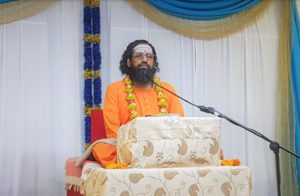 The most important component which invites the Lord in one’s life is – the seva of the Lord and the remembrance of the Lord. Shri Bharatji not only remembered the Lord, but he also served Him a lot.
The most important component which invites the Lord in one’s life is – the seva of the Lord and the remembrance of the Lord. Shri Bharatji not only remembered the Lord, but he also served Him a lot.
- When Shri Bharatji went to Chitrakoot to bring Bhagavan Ram back to Ayodhya, very touching conversation takes place between Bhagavan Ram and Bharatji. Ramji was ready to return to Ayodhya as per Bharatji’s wish, but Bharatji said beautifully, ‘O Lord! If You are compelled to return to Ayodhya to respect my wish, then there is no worse person than me.’ Bharatji was born to set the standards of a true sevak!
- While in Chitrakoot, Bharatji also said to Bhagavan Ram, ‘See how wicked I am? Without Your permission not only I came in this quiet forest where You were spending your time in satsang, but I also brought the big army of Ayodhya with me and now You have to give attention to everybody. This is my wickedness. I should have asked You first. Please tell me Bhagavan what shall I do?’
- Bhagavan Ram told Bharatji that he should go back to Ayodhya and look after the kingdom, as Shatrughan is also alone. He and Lakshman would remain in the forest to keep their father’s words and protect Dashrathji from getting a bad name. But during all this, Bharatji will be the only one who would bear the brunt and would have to go through this sorrow.
- Bhagavan Ram gave a very nice example – ‘If somebody is throwing a sword on you, on the face or the head, the hand comes in the front to protect and bears all the brunt so that the face and head can be protected. Even if the hand starts bleeding, it keeps protecting. O Bharat, you become that hand to protect Ayodhya, to protect Me!’
- Shri Bharatji expressed his gratitude to Bhagvan Ram for telling him what he should do and then he took Bhagvan’s paduka on his head and started returning back to Ayodhya and said, ‘O my Lord! We have given you enough troubles, now we will leave. I will remember You all 14 years – day and night, I will somehow pass time. But Bhaiya, if You take even one day more than 14 years, I don’t think that I would be able to hold my praan. So please don’t delay!’
- There can be no brother like Shri Bharatji. During those 14 years, he counted every day, every second. While sleeping, walking, eating, talking, Bharatji constantly remembered Bhagavan Ram. Devotion is only when you forget yourself completely. The biggest enemy of love is self-remembrance.
The Most Awaited Moment
- When it was the last day of exile and Bhagavan Ram was coming to Ayodhya in Pushpak-viman, all the people of Ayodhya came to receive Him. People were playing drums, blowing conch, and were expressing their joy by singing & dancing, there was festival mood all around. Wherever Bhagavan comes, festivities follow Him. Even in your house, when you sing Lord’s name, it is festival at that time. In your heart if Bhagavan is there, festival is there.
- Shri Bharatji was not dancing or singing, his eyes were fixed in the sky, he only wanted to see Bhagavan Ram. He had gone through enough pain. Love is a very typical thing; if real love is there with somebody, you become mad. This world is meant to become mad for something Higher, not lower.
- When everybody was seeing Pushpak-viman, Shatrughnaji was watching Bharatji, he thought if Bharatji needs anything he shouldn’t have to look elsewhere. When you are serving somebody, you should be fully devoted in serving. This should be the ideal for a sevak. We should listen about such sevaks so we can also imbibe some of their seva bhav.
- Everybody told Bharatji to go and receive Bhagavan Ram first but Bharatji said, ‘I won’t go in the front; Gurudev should be the first one as he only taught me how to love Bhagavan.’ Vashishthaji went and stood in the front and then Bharatji was told to stand behind but again Bharatji refused and requested the Brahmins to go before him. There were hundreds of Brahmins and then in one corner Bharatji stood silently. Every small step of a person speaks volumes about his principles.
The Ultimate fruit of Tapasya
- The ultimate fruit of Shri Bharatji’s tapasya was that Lord Ram returned to Ayodhya. When Bhagwan Ram got out of the Pushpak-viman, His eyes searched for Bharatji. But Ramji always practiced His dharma. His Guru-bhakti was strong and He first ran towards his Guru Vashishthaji and fell flat on the ground. Vashishthaji embraced Him and without taking much time, told Him to go to Bharatji.
- Only after getting permission from His Guru, Ramji went. First Ramji offered His respects to the Brahmins and then went towards Bharatji. This was the moment that Bharatji had been waiting for so many years. He fell at the feet of Bhagavan Ram and held them, he was full of bhaav (sweet emotion). He did not want to leave Ramji’s feet.
- Bhagavan Ram embraced him and both their backs got wet with each other’s tears. Ramji was crying thinking of the tapasya and service of Bharatji and Bharatji was crying thinking about the hardships his brother had to go through. Bharatji wished he was not born so that Ramji would have not had to go through the exile.
- Serving is the only way anybody can come close to the Lord. Even in our lives we get close only to the people who serve us. Serving is giving joy to the one whom you love. It is the most difficult thing because while serving there is no place for your likes and dislikes, your comforts, ego, attachment, hatred, anger, jealousy or competition.
- Bharatji served very well, he did the work of Bhagavan Ram for 14 years tirelessly. He made the whole Ayodhya shine under his able administration and made sure everybody’s needs were taken care of. He earned the love of Bhagwan Ram. Love does not come free of cost, it is hard earned.
- Everyone who had come along with Ramji, they were all looking at Bharatji. If someone is very humble, he steals the limelight. When someone falls on your feet, your eyes naturally go there. We can’t force someone to see us.
- Bhagavan Ram then met Shatrughanji, embraced and praised him for how he took care of Bharatji. All the brothers met with each other and then they met Sitaji and
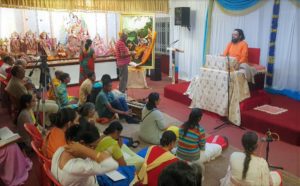 the Mothers who were longing to this moment very eagerly.
the Mothers who were longing to this moment very eagerly. - Bhagavan Ram then had to meet all the people of the city as well. So He decided to make many forms of Himself. If someone was elder, He bowed down; someone who was very close, He embraced. He met everyone as it was as needed. Everyone was very happy as they were all waiting since so long.
Four Pillars of Vyavahar (Behaviour)
Our behaviour (vyavahar) is an integral part of our lives, be it in our meetings, interactions or thinking, and it can be a big source of peace as well as disturbance. There are four key aspects that define our vyavahar:
- Nirahamkarta (Being Egoless) – not trying to show that we are bigger than someone. Our behavior gets sour when ahamkara (ego) comes and then the joy of interaction goes away.
- Nishkamta (Selflessness) – not wanting anything and only having the bhaav to give joy to others.
- Kshama (Forgiveness) – refers to the ability to forget and forgive others.
- Prem (Love) – means to have a lot of love towards everyone.
Good Vyavahar – Beauty of Bhagavan Shri Ram
- When Shri Ram introduced Guru Vashishtha to everyone, He said, it is only by His Guru’s grace that He could kill Ravan. He expressed gratefulness for all that Vashishthaji had taught Him since childhood.
- If one is not grateful, such a person cannot serve and won’t have a contended heart. The thought of getting a lot is called the contentment of the heart. Ramji establishes Guru Bhakti and reinforces that without Guru Bhakti one won’t get Ishvar Bhakti (devotion for the Lord) or Shastra-gyaan (knowledge of the scriptures).
- When Shri Ram introduced Hanumanji and others to everyone, He says all of them were like a boat that helped Him cross the ocean to battle against Ravan, Kumbhkaran etc. Ramji displayed His egoless nature (nirahamkarta) by attributing His victory to all.
- Ramji himself went to Mother Kaikeyi and told her that it was not her fault, everything happened as per God’s desire; Ravan had to be killed; and it was because of her that He met the great saints like Valmikiji. He did not blame her for any suffering over 14 years of exile, and just asked her to smile. Such was the forgiving nature (kshama) of Shri Ram.
- Bhagavan Ram then went to Bharatji and very lovingly told him that he had done so much tapasya, he should not cry anymore. He helped Bharatji take bath, set his hair, put his clothes. Such was the loving nature (prem) of Shri Ram. Being loved by the Lord is a very big feeling. If you deserve it, the benevolent Lord will give it!
Day 4
On the last day of the mesmerizing yagna, Swami Abhedanandaji beautifully described the coronation ceremony of Lord Ram and the beautiful Ram Rajya. We bring to you some pointers from Swamiji’s talk:
The aim of our life should be to have permanent Ram Rajya and Diwali in our hearts. We may fail but we must get up and try again.
Why was Bhagavan Ram so eagerly awaited?
- When Bhagavan Shri Ram came to Ayodhya, the whole kingdom was waiting for Him eagerly. Although 14 years was long time nobody had forgotten Bhagavan Ram, rather they were all praying, fasting and preparing to welcome Him. That shows when He was in Ayodhya, His nature would have been very good. If somebody’s nature is very good and he gives a lot of love & joy, then he is wanted by everyone everywhere.
- Bhagavan Ram was missed because nobody could give that much love to people as He used to give. You define yourself in others’ heart by your good and loving nature. You will be a charm in your family, in your office, only when you serve others, do some renunciation for them and give out unconditional joy.
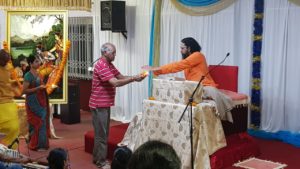 Secret of Loving
Secret of Loving
When Bhagavan Ram reached Ayodhya He showered his love for Bharatji and everyone.
- Love is based on getting favorable and blissful responses from the beloved. If the other person doesn’t acknowledge our love and doesn’t respond to it, then the love decreases.
- If two people love each other a lot, it only means that there is a high level of response between them. It is as if they are in a competition to give responses; they both feel that they should give more love to each other. This is called the joy of loving and this is how love grows.
- A peculiar thing about loving God is that one has to experience for himself that God responds. If Bhagavan doesn’t respond, then it is difficult to love Him.
- A beautiful thing about love is that – there is no limit to how much joy and attention you can give to someone you love. You have limitation in giving out your money etc., but how much love you can give, Bhagavan has not put any limitation to that at all.
Make God your strength
- In every aspect of our lives we need a Godfather like figure; a higher authority who can support us, love us, take care of us, whom we can rely upon and who would not forsake us. Lord alone can be our Godfather at all times; hence we need to make the Lord our strength.
- Making Lord our strength means – for everything big and small that we need in our lives we go to Him and ask for help till He comes. Arjun had made Lord Krishna his strength, so no one could touch him when Bhagavan was there.
- But for Lord to come in our hearts and help us, we need to build a relationship with Him by serving Him, through our japa, puja, actions and upasana. And then He will surely come, even if we don’t call Him. Love develops slowly, we should try to at least offer namaskar, offer some flowers etc. and remember the Lord everyday to establish the relationship.
- Devotees gain authority from the Lord and the way to gain the authority is through service. It was not that Draupadi had called Bhagavan Krishna for the first time at the time of cheer-haran. She had gained the authority to call Bhagavan Krishna and therefore He came. Even we respond to only those who serve us.
- To create a relation with the Lord, one can take support of the Lord’s katha and learn from the examples of great devotees like Bharatji. One can learn from the life of saints, who have no attachment or ego. For them good and bad times are the same. For them bad times mean God has taken away something, but He is there, He has not left then alone. Anybody can snatch your money or power but none can snatch your love for God.
Lord Ram’s love for His devotees
- After the coronation of the Lord, Vibhishanji, Sugreev, Jambvantji etc. stayed with Bhagavan Ram for six months. One day Bhagavan Ram called everyone and said, ‘Nobody is dearer to me than my daas, but now you all please go home’. Everybody was sad on hearing the Lord’s words; but then He gave them Vedantic upadesh and offered them numerous gifts.
- When Angad’s name was called, he said to the Lord, ‘Please don’t ask me to leave, I have no one else, you are my father, mother, Guru. I am very childish, I don’t know anything. I will not sit lazily, I will mop the floor, I will clean the dishes, I will never think whether work is small or big. But don’t ask me to go.’ This is deenta, this is ananyta. Bhakti thrives on these emotions.
- Seeing this, Bhagavan Ram got up and embraced him. The Lord then offered him is own mala and said, ‘Angad, wherever you are, you can serve me. Your prarabdh is there, you exhaust and then you come back.’
- Among all, Bhagavan Ram did not ask Hanumanji to leave. Everyone had some attachemnt somewhere in the world, some had wife, some had kingdom, but Hanumanji did not have any attachment. He only wanted to serve the Lord; he only wanted to give everything to the Lord. This is the earning of a person that whom you serve wishes that you should not go and should not leave him.
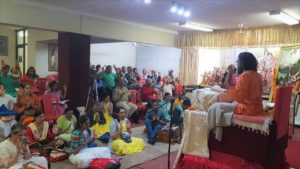 Serving the Lord through people around
Serving the Lord through people around
- We all have certain areas of actions; we cannot choose or decide our area of action. But wherever we are, we must use the situations and people around us to propitiate the Lord. These situations and people are not meant for our own enjoyment.
- There is no situation when we cannot serve God. There is no time or place where we cannot do some good to those around us. If nothing else, we can just think good and offer love. It is never too late for that.
- As the saying goes, “Praptasya upeksha, apraptasya apeksha” i.e. we tend to neglect the ones around us and desire for what we don’t have. We should serve those around us and use them as a vehicle to serve the Lord, that’s the way to live in this world.
- When you are not able to please the God, you should be hurt inside. Just the way a mother’s mind is sensitised to the child’s needs, we should also have such sensitivity towards the Lord.
Foundations of Ram Raj
- Ram Raj was based on ‘Dharma palan’ (following the Dharma) and ‘Sharanagati’ (surrender). If one follows his or her Dharma, nobody hates them. A person is unlikeable when he does not complete his duties.
- Our duty is the right of others and if we do not perform our duty we take away other’s rights. Taking away the right of somebody causes friction.
- Thus, in Ram Raj nobody was inimical and everybody was happy creating an environment of love. In Ayodhya, people didn’t have Bhed buddhi (sense of distinction), they had Abhed buddhi (sense of oneness); thus anand (joy) was there. This is the basis of Ram Raj, and the basis of a family.
This was the Diwali; everybody was smiling and happy. Where Ramji, Sitaji, Lakshmanji, Bharatji, Hanumanji, Shartuganji, Vashishthaji, all are residing, how can anyone be sad! Ram Raj has to be there! Bring all of them in your heart this Diwali and let there be an eternal celebration!



